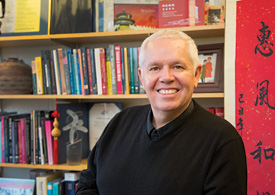
Photo by Scott C. Soderberg, Michigan Photography.
Dr. Matthew Boulton doesn’t speak Chinese, but that didn’t stop him from founding the School of Public Health’s China Scholar Exchange Program.
At dinner with a former health department colleague in Beijing several years ago, Boulton drew up the outlines for the program on a dinner napkin, and since the program began in 2006, more than 100 U-M students have completed internships or service learning trips working with China’s disease prevention centers, and 24 Chinese scholars have come to the School of Public Health to study and work for semester-long rotations.
Boulton, an associate professor of epidemiology, preventive medicine, and health management and policy in the School of Public Health, and an associate professor of internal medicine in the Medical School, started his career at U-M as a lecturer immediately after finishing his master’s in public health here in 1992. He worked in local public health concurrently, serving Wayne and then Washtenaw, Livingston and Jackson counties, before he became the state epidemiologist and the governor’s chief medical executive for all of Michigan in 1998. Boulton stayed in this position until 2005, when he became a full-time professor.
What moment in the classroom or lab stands out as the most memorable?
In general, just the change in the students — students now are more likely to challenge you than they were in the past, which in the end is probably a good thing.
What can’t you live without?
My family.
What is your favorite spot on campus?
That’s an easy one — my wife and I often have lunch on the bench by the Bell Tower that’s close to the fountain. That’s my favorite spot on campus, without a doubt, especially in the summer.
What inspires you?
The people I work with here who are dedicated to public health, both in academics and in practice, and devote their lives to improving the health of others.
What are you currently reading?
“India: A History” by John Keay.
Who had the greatest influence on your career path?
My mother, who opened up an intellectual world to me by making books always available and making reading a lifetime priority, even though she never had that kind of access or encouragement in her own life.
Raised and educated in rural Nevada, Boulton came to Ann Arbor to do his residency at the U-M Hospital. “I always knew I was very interested in working with people and was trying to envision a career that permitted me to make a lasting contribution,” says Boulton on why he chose medicine over botany, his other scientific passion. He still studies plant taxonomy to satisfy his “abiding and sustained interest in natural history,” but spends most of his research time looking at vaccine-preventable diseases.
Boulton mentors several School of Public Health doctoral students who are studying immunizations internationally. In China, Boulton and his team are working with the Chinese government to eliminate measles. “We still have progress to make, but we have reasonable prospects globally of eliminating measles from the world … and I’m sure we’ll see that day during our lifetime,” Boulton says.
Aside from China, Boulton also works with the government of India. “I feel like a small public health investment (in India and China) could go a long way; there’s tremendous possibilities for improving the quality and length of life in India,” Boulton says. India has the lowest immunization rate in the world, and his work there is mostly focused on devising strategies to increase immunizations rates in children.
He often travels with his family (Boulton has four children) and looks forward to continuing his work abroad. “I enjoy working in novel settings which are highly fluid and unpredictable” says Boulton. “I feel I work best when I have to be rapidly adaptable and make the right decision quickly.”
The weekly Spotlight features faculty and staff members at the university. To nominate a candidate, please contact the Record staff at [email protected].

